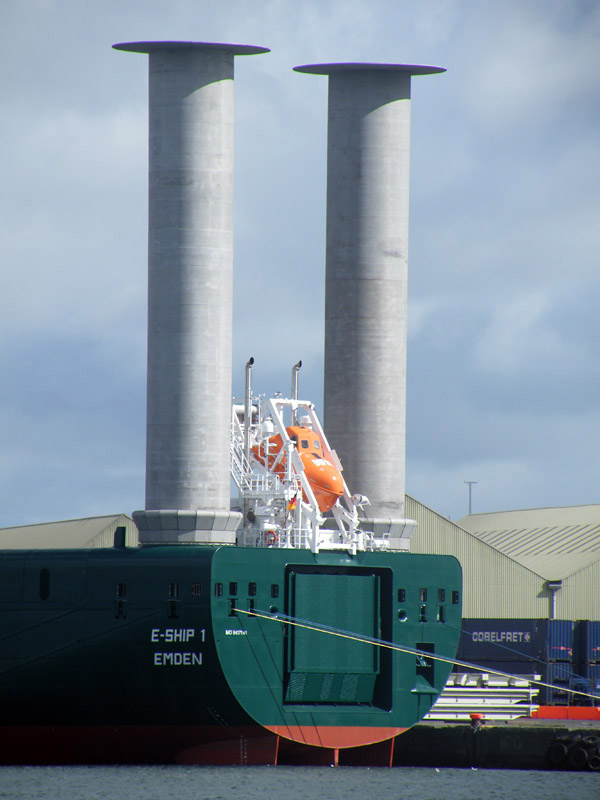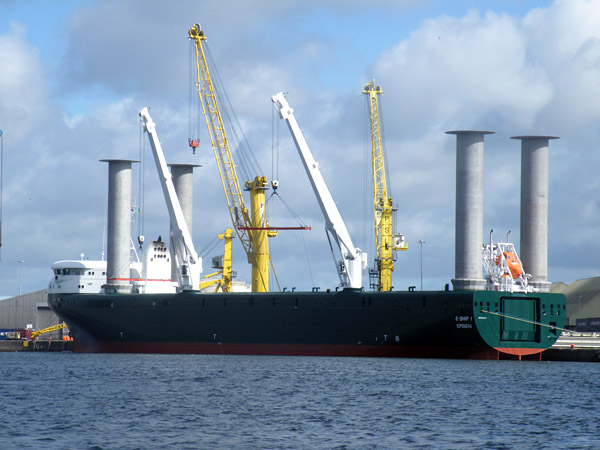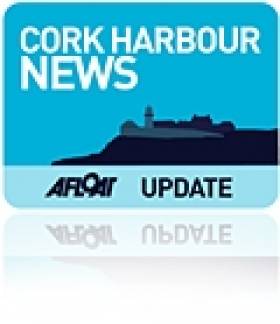Displaying items by tag: wind energy
Wind Turbine Plan for Cork Harbour
A public consultation process is underway.
The turbines would provide a renewable energy source for four major healthcare manufacturing companies based at the pharmaceutical hub of Ringaskiddy.
The four companies, Centocor, DePuy, GlaxoSmithKline and Novartis, are planning to build the turbines on each of their four sites, dotted around the Ringaskiddy peninsula, some 18km southeast of Cork city.
New Ship Tower Sails into Dublin
A revolutionary newbuild multi-purpose cargo vessel, E-Ship 1, docked at Dublin port for the first time today writes Jehan Ashmore. The vessel had arrived from Emden, Germany with a cargo of wind-turbines bound for a project in Leinster.
At both the fore and aft of the new vessel stands a pair of giant metal circular towers which gives the ship a highly distinctive profile. Each of the four rotor tower "sails" are 25 metres high and four metres wide and these towers are driven by electro-motors which together with the wind harness wind energy to provide thrust for the 12,810 gross tonnes vessel. The ship does retain a conventional engine plant below deck and a streamlined superstructure and sleek hull to
reduce drag.
With all these innovative features, E-Ship 1 derives its project name from the enviromental ethos of her owners, Enercon, one of the leading manufacturers of wind-turbine technolgy. The newbuild is also termed the "Turbo-Sail Freighter" which apart from using wind energy to cut down fuel costs and measures to reduce emissions, there is also a double hull to lessen pollution from oil pollution incidents.
The origins for the concept of the E-Ship 1 is not new. In 1852 the Magnus Effect was invented and is named after the works of German physicist, Heinrich Gustav Magnus. The Magnus effect is a force acting on a spinning body in a moving airstream, which acts perpendicularly to the direction of the airstream; in essence when applied to ships, propels the vessel forward.
Another, German, the engineer, Anton Flettner adapted the concept in 1925 with the first rotor vessel, Buckau, a former schooner that was refitted with rotors driven by an electric propulsion system. On several North Sea voyages, the rotors performed well, despite stormy seas, though the technology was not deemed successful enough as the conventional engines were still more efficient and with the low fuel costs remained cheaper to operate.
With the threat of global warming, times have changed dramatically and the need for the concept of the Flettner's rotor-sailing ship has come full-circle with the launch of E-Ship 1 in 2008. Using the latest technology developed for E-Ship 1, Enercon carried out extensive sea-trials last year and first sailed commercially this year.
E-Ship 1 was firstly built at the German shipbuilder Lindenau-Werft, but the yard was declared insolvency. This led to the newbuild to be towed in January 2009 to and completed by the Cassens Werft in Emden.
Enercon was founded in 1984 and has since installed over 16,000 wind turbines in over 30 countries. The specially designed ship will be able to continue transporting wind turbines and components worldwide in addition to heavy lift-cargoes, containers and dry cargoes. The E Ship 1 is due to depart Dublin on Wednesday.

(Below) The revolutionary rotor-sail, wind energy concept newbuild, E-Ship 1 at Dublin on 10 August and (Above) Stern-view of E-Ship 1 with aft-rotor sails and stern-ramp Photo Jehan Ashmore/ShipSNAPS































































